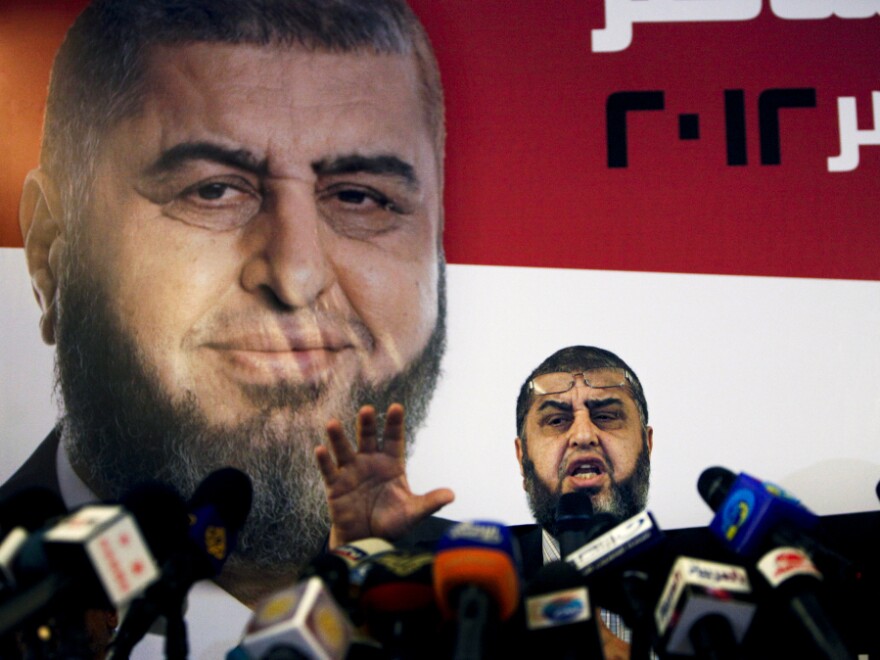In Egypt, next month's presidential election has undergone a wrenching several days.
First, leading Islamist candidates faced possible disqualification on legal grounds, and then, hours before the deadline to register, a leading face from the regime of Hosni Mubarak jumped into the race.
The appearance of 75-year-old Omar Suleiman, Mubarak's former intelligence chief, has sparked fears that the military council running the country is maneuvering to bring back the old regime.
Few could blame Egyptians for complaining about a severe case of political whiplash. Just 15 months after demonstrators celebrated the fall of Mubarak, a much smaller but no less boisterous crowd cheered the reappearance on the political scene of the man sometimes called the power behind Mubarak.
To some Egyptians, exhausted by a year of turmoil, economic decline and uncertainty, Omar Suleiman represents stability. His first interview to a state-run newspaper featured a promise to restore security and then focus on the economy.
But for many other Egyptians, who remember the hundreds who gave their lives to topple the old regime, a Suleiman presidency would bring not stability but utter chaos.
"There will be another revolution, and this time it will have an Islamic engine," says 35-year-old Mohammed Abdel Rahman. "Nobody will be able to contain it."
Islamist Forced Out Of Race
Abdel Rahman and thousands of other Egyptians gathered in Cairo's Tahrir Square last Friday to protest a finding by the presidential election commission that would appear to disqualify the most conservative Islamist in the race, Hazem Abu Ismail.
Egyptian and U.S. authorities report that Abu Ismail's mother held U.S. citizenship, which is not allowed for an Egyptian presidential candidate.

The main beneficiary if Abu Ismail is tossed from the race would seem to be another Islamist, the Muslim Brotherhood's late entry, millionaire Khairat el-Shater.
But many of those gathered in Tahrir Square agreed with English teacher Mohammed Khalifa, who fears that the military council may try to force all the top Islamist candidates out.
"Things are not clear, and the military council is holding things up. Things are not going straight," he said. "We're moving from a plot to another, we're moving from an artificial problem to another. We don't trust anyone. I don't trust anyone, neither anybody here. We don't trust anyone."
The ruling military council has said it is committed to staging free and fair elections, a position viewed with increasing skepticism on the street.
Muslim Party's Credibility Damaged
Even the Muslim Brotherhood is suffering from a series of about-faces and flip-flops.
First, the party promised to run for a limited number of parliamentary seats, only to win nearly an outright majority.
Then, it promised a limited membership on the panel assigned to draft a new constitution, and then packed it with their supporters, according to critics. And after a year of saying it wouldn't field a presidential candidate, it launched el-Shater's bid.
Brotherhood official Amr Darrag acknowledges that some are saying the party's credibility is damaged. But now that Suleiman has emerged from the shadows, he says Egyptians are beginning to realize that the Brotherhood is acting to prevent the military from turning back the clock to before the revolution that began on Jan. 25 of last year.
"Our original intention was not to run for this position. But when we realized that somebody is trying to get us back to the 24th of January 2011, as a matter of fact this was the main reason for fielding Khairat el-Shater," Darrag says. "We had to field a candidate because we feel that this was the only way to protect the revolution."
Moderates And Liberals Appear Shut Out
Left on the sidelines for the moment are the youth movement that started the revolution, and moderates and liberals hoping for a democracy in Egypt that protects women's and minority rights.
There was, however, a glimmer of hope for those voters in one recent poll, taken before el-Shater entered the race, which showed former Arab League head Amr Moussa as the front-runner.
Media owner and longtime human rights activist Hisham Kassem says Egypt's revolutionaries would do well to consider a compromise candidate like Moussa, or risk the classic danger of post-revolution states — one person, one vote, one time.
Sudan "had a similar election to what is happening now in Egypt," Kassem warns. "They voted a government and a president. Three years later the military overthrew them, and we ended up with Omar al-Bashir. ... He's approaching 30 years now in power."
A final list of Egyptian presidential candidates should be announced later this month.
Copyright 2020 NPR. To see more, visit https://www.npr.org.



